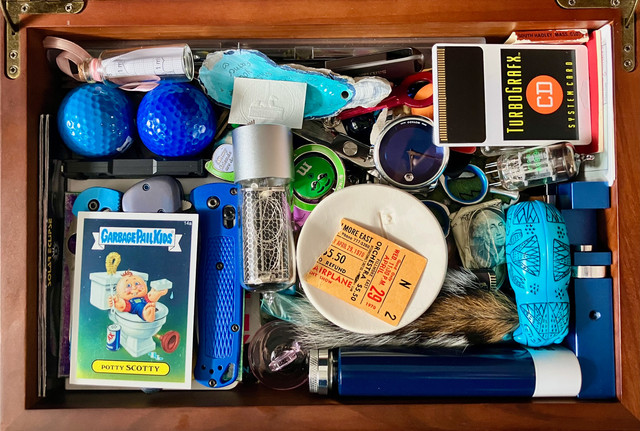HOME | DD
 SofiaBlythe2014 — Screenless Vs Library Leapfrog
SofiaBlythe2014 — Screenless Vs Library Leapfrog

Published: 2020-11-06 10:01:04 +0000 UTC; Views: 1495; Favourites: 3; Downloads: 0
Redirect to original
Description
Hey everyone. This is SofiaBlythe2014. For this comparison, I'm comparing The Simpsons episode "Screenless" to the Muppet Babies 2018 episode "Library Leapfrog". They're both about not being too attached to technology and realizing how it's good to expand your horizons. To show how Muppet Babies did better, we look at these factors: Story, Major Character, Supporting Characters, Message, and Conclusion. Let's begin.Story:
Screenless: This episode involves Marge trying to teach Maggie sign language, but the rest of the family is absorbed into their technology. She then takes away the technology after they break their time limit, but she finds herself addicted to it also. She signs herself and the family up for a month at the Screen Addiction Rehab Center, as run by Dr. Lund. However , he keeps them captive when they want to leave. Yeah, the real problem with the episode is the pacing. While the plot about sign language factors into the climax, it's never mentioned in the second part, meaning it could've been cut out and nothing would've changed. The pacing would've improved if, as mentioned, they cut it out, or integrated it into the plot better, like if they decided to use it as entertainment before trying it out in the climax.
Library Leapfrog: The episode involves our main characters, including Robin, going to the library. While everyone else is excited, he isn't, preferring to play his video game. Everyone else tries showing him how fun it is to read. The pacing works much better even with half the time. The reading aspect is woven more into the plot without beating you over the head, making it easier to follow thanks to smooth pacing.
Major Character:
Screenless: The Simpsons family is somewhat of a mixed bag. With the opening scene of everyone except Marge hooked on technology, it's annoying, but doesn't overstay its welcome. They do legitimately try to go without technology, but only after they get caught trying to cheat, doing so more so Marge would shut up. Marge herself is also not the best. I do know that it's possible to relapse into old habits. The issue with her is how she keeps presenting herself as so high and mighty that when she gets caught, it's also just to get them to shut up and not because she has a problem.
Library Leapfrog: Robin himself is quite likable. He's all about action, whether in adventures or playing games. From his perspective, it's understandable that reading books is less exciting since it's just reading words off a page. However, he never tries telling anyone to stop reading , showing how he does still care for them. It also helps that, while attached to his video game, he's still able to act without it, and even put it to good use when his video game gets stolen later on.
Supporting Characters:
Screenless: The only other character who stands out is Dr. Lund. He's fine I guess. He's a corrupt doctor who secretly steals confidential online information from his patients. That's actually pretty cool. He probably would've stood out more if he was a more consistent threat or at least dropped more hints of his corruption. He's not that bad though.
Library Leapfrog: I do like how everyone is portrayed here. Kermit, Animal, Fozzie, and Gonzo do encourage him to read, but they never give off the idea of video games being mad. In fact, they even help him get his video game and just let him get absorbed into the book . In the stories, Piggy and Summer cast themselves as the bad guys when acting out the stories, and they play the roles well. Even with them going against their friends, it's played out more like a fun rivalry, befitting how the characters care for each other.
Message:
Screenless: The message of the episode seems to involve the idea of "all or nothing" when it comes to technology. There's no problem with going for this approach in theory. The issue lies in how they can barely function and act like ravenous animals who don't care about each other. That's just sad. Perhaps if they showed more signs of caring for each other, or could at least function without technology without going too insane, it could've worked.
Library Leapfrog: The episode takes a typical "reading is good" message, and makes it fun thanks to the three stories. The first story, a wild west story called The Ponytail Bandits Ride Again. They then go into the second book, Pink Bow The Pirate, and go after them on the high seas. The third one is Zorna And The Muffonians From Outer Space, where they have to take on a giant muffin monster. The surrealness of it all helps make it enjoyable.
Conclusion:
Screenless: Yeah, I'm not fond of the conclusion. I admit that the family using sign language to communicate with each other during the escape is pretty cool. However, the family doesn't really reflect on what to do. We instead get a lame joke of Chief Wiggum trying to strike a conversation with Dr. Lund. It's pretty lame.
Library Leapfrog: The ending is pretty good. While Robin gets his game back after the adventure is all done, he's more excited about the book and checks it out . It's simple, but it fits with the ending.
Winner: Library Leapfrog
Here are the writers for the episodes.
Screenless: J. Stewart Burns
Library Leapfrog: Francisco Paredes
Thanks for reading. Have a good day.

























